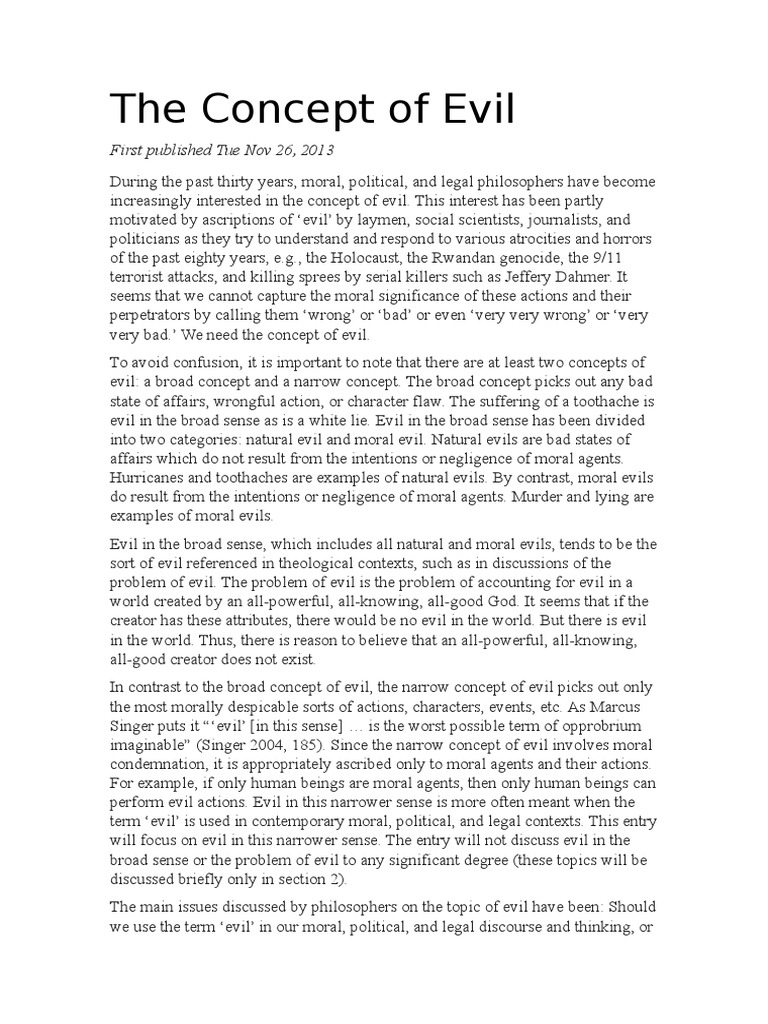The Bahá’í Faith, a religion founded in the mid-19th century in Persia, offers an intricate framework for understanding morality that transcends conventional dichotomies of good and evil. Within this theological paradigm, the concept of “extreme evil” takes on unique dimensions, inviting adherents to reassess their preconceptions and cultivate a deeper awareness of moral complexities. This discourse seeks to elucidate the Bahá’í perspective on extreme evil, aiming to stimulate contemplation and provoke dialogue.
Firstly, it is imperative to delineate what constitutes extreme evil from a Bahá’í viewpoint. Unlike absolute evil, which is often portrayed as an inherent and immutable quality, extreme evil is perceived as a manifestation of human actions that diverge significantly from the divine directives espoused in Bahá’í teachings. It is not an intrinsic attribute of individuals but rather the result of a profound neglect of spiritual teachings and ethical responsibilities.
In the Bahá’í worldview, every action stems from the conscious choices of free will. Thus, extreme evil may be perceived as a systematic transgression against the principles of justice, compassion, and unity, leading to devastating consequences for individuals and society at large. This perspective encourages followers to scrutinize the motivations and circumstances that engender such corrosive behaviors, fostering a culture of understanding instead of condemnation.
Moreover, the Bahá’í Faith elucidates that the roots of extreme evil often lie in ignorance and the egoistic pursuit of self-interest. Individuals entrenched in materialistic desires may perpetuate harm against others, culminating in widespread social discord and suffering. This recognition shifts the focus from a simplistic binary view of good versus evil to a more nuanced examination of the socio-economic, cultural, and psychological factors contributing to moral lapses.
To comprehend the implications of extreme evil, one must consider how it signifies a profound disconnection from the divine essence that underpins human existence. Bahá’u’lláh, the founder of the Bahá’í Faith, emphasizes that all human beings are inherently noble and possess the capacity for goodness. It is, therefore, not inherent malevolence that drives individuals towards acts deemed extremely evil but rather a failure to recognize their unity with all creation.
The teachings advocate for the transformation of negative tendencies through spiritual education and the cultivation of virtues. In combating extreme evil, Bahá’ís are encouraged to adopt a proactive stance, promoting love, tolerance, and reconciliation. This proactive engagement not only seeks to ameliorate the effects of extreme evil but also strives to prevent its emergence by nurturing environments conducive to unity and understanding.
A vital component in addressing extreme evil is the principle of accountability. The Bahá’í Faith asserts that individuals must take responsibility for their actions, acknowledging the ramifications that their choices may have on the collective welfare of humanity. This notion of accountability extends to institutions and governments, urging a commitment to justice and ethical governance that safeguards against the proliferation of extreme evils.
Furthermore, the Bahá’í teachings encapsulate a vision of universal peace, advocating for the establishment of global solidarity as a countermeasure to the pervasive forces of extreme evil. Such peace cannot be merely the absence of conflict; it necessitates an active striving towards nurturing understanding among diverse cultures and communities. The Bahá’í model of world citizenship underscores the interconnectedness of all peoples and posits that genuine security emerges from fostering collaboration rather than confrontation.
To broaden the discourse around extreme evil, Bahá’í teachings encourage deep reflection on historical instances of egregious transgressions against humanity, such as genocide and systemic oppression. Through understanding these phenomena, Bahá’ís can cultivate empathy and resilience, fostering a commitment to prevent their reoccurrence. This historical consciousness connects individuals to the broader human narrative, emphasizing the importance of collective memory in the pursuit of justice.
Additionally, the Bahá’í perspective implores individuals to engage in spiritual practices that enhance their inner resolve to oppose extreme evil. Prayer, meditation, and community engagement serve as vital instruments in this journey, reinforcing the belief that spirituality equips individuals with the strength to counteract darkness. By nurturing one’s spiritual life, Bahá’ís can embody the virtues essential for combating the manifestations of extreme evil in their surroundings.
The repercussions of extreme evil extend beyond immediate harm; they ripple through generations, shaping cultural narratives and societal structures. In recognizing this, Bahá’í teachings advocate for restorative practices that seek to heal rather than punish. This approach aligns with the global vision for reconciliation as a pathway to restoring harmony both within individuals and in society at large.
In conclusion, the Bahá’í perspective on extreme evil offers a transformative lens through which to analyze and confront moral failure in contemporary society. By acknowledging the complexities of human behavior and the intrinsic nobility of every soul, this faith challenges its followers to contribute to a world founded on justice, unity, and compassion. Embracing these principles not only promises a shift in individual perceptions but also has the potential to reshape societal norms, inviting all people to engage in a collective journey towards eradicating the deep-seated roots of extreme evil. Ultimately, the teachings inspire a proactive commitment to nurturing a more humane and just world, where compassion triumphs over animosity and ignorance is replaced with enlightenment.
